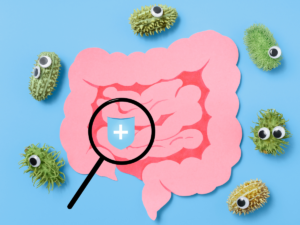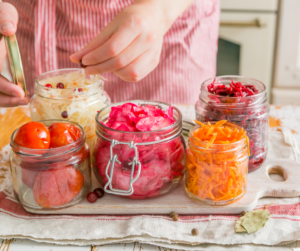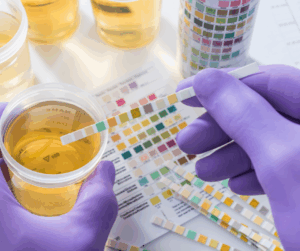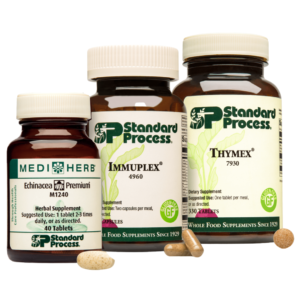By Claire Bacon, ACN, CNC
From the day we are born, we are literally a walking immune system. It largely defines our health as we grow up, and especially influences our later years. You could say, we “are” an immune system, more than we “have” an immune system. As a matter of fact, as we age our immune system becomes what MOST supports our longevity and quality of life.
What Comprises the Immune System?
The immune system is a collection of biological processes and structures to help protect against diseases and pathogens. The various components must be able to detect a wide variety of foreign invaders to protect our healthy tissues. These could be viruses, bacteria, or even parasites. Furthermore, the immune system must be able to discern “self” from non-self.
The immune system is made up of unique components that play specific roles in keeping you healthy. The main components of the immune system are:
- Bone marrow – where the white blood cells, red blood cells, and platelets originate
- Thymus – a gland that produces the hormone thymosin, which matures our T cells, until it reduces in activity as we age.
- Lymphatic vessels – carry immune cells throughout the body, and into the brain
- Lymph nodes – areas between the lymphatic vessels where immune cells cluster
- Spleen – filters the blood of damaged red blood cells. And together with the lymph nodes, bone marrow, and GALT, it stores special immune cells called memory B and T cells, so your body can respond faster if the same germs show up again.
- Tonsils – trap germs (viruses and bacteria) that you intake, and then activate immune responses, including producing antibodies and signaling other immune cells, to prevent infections from spreading deeper into the body.
- Mucosal membranes – the first line of defense against potential antigens – both microbial and dietary
- White blood cells (aka leukocytes) include monocytes, lymphocytes, neutrophils, eosinophils, basophils, T and B lymphocytes, and natural killer cells.

The Gut-Immune Connection
It’s becoming increasingly clear that your brain, your immune system, and your gut microbes are intricately linked. This wasn’t clear until groundbreaking research came out in 2015. But now, a gut-brain axis and pathways from your immune system to your brain have been uncovered. This is why if we want to have a clear head and strong immunity well into our golden years, we need to pay attention to the living organisms in the gut. How we feed ourselves (and our gut microbes) really matters!
The gut is a central hub for the immune system, housing roughly 70% of the body’s immune cells. A healthy gut lining and a diverse microbiome help the immune system distinguish between harmless substances and potential threats. Beneficial gut bacteria interact with immune cells to modulate inflammation, produce short-chain fatty acids that nourish the intestinal barrier, and support the development of immune memory. When the gut microbiome is disrupted—it can compromise immune defense, increase susceptibility to infections, and promote systemic inflammation.

Best Foods to Fuel the Gut-Immune Connection
Foods that nourish beneficial gut bacteria can indirectly strengthen immune function. These include fermented (living) foods, prebiotic-rich vegetables, high fiber fruit and veg, nuts and seeds, and polyphenol-rich foods. To cover all the bases, you’ll want to eat several of these foods daily:
- Yogurt, kefir, sauerkraut, kimchi, miso
- Garlic, onions, leeks, asparagus, Jerusalem artichokes
- Berries, apples, carrots, leafy greens
- Almonds, walnuts, pumpkin seeds, flaxseeds
- Homemade bone broth and Celtic sea salt
- Green tea, cocoa, and olives.
Consistently including these foods helps maintain a diverse, resilient microbiome that supports a robust and balanced immune system.

Why the Elderly are At Risk for Acute Infections
The elderly can be more at risk for infections because of:
- Poor dietary choices lacking key minerals,
- Chronically poor digestion, absorption, and/or elimination,
- Sedentary lifestyle,
- Increased pharmaceutical usage, and
- Natural decline of immune function.
Our Elders Need Freshly-Cooked Food
Way too many of our elderly population have given up on cooking. It is easy to drink a Boost or Ensure or to have a bowl of cereal. However, if you read the labels, you’ll be shocked at how much sugar is in there! Did you know, sugar is one of the top things to suppress the immune system. On top of that, synthetic vitamins don’t do much good.
It is a sad state that our modern American diet commonly leads to chronically poor digestion and absorption. Many elderly people have a lack of hydrochloric acid and enzymes, resulting in constipation or fungal overgrowth. Because of this, protein digestion is compromised, B12 absorption is lacking, and the minerals we need can’t get absorbed.
Bring your grandparents a home-cooked meal this week. They will appreciate it!

What’s the Best Way to Prevent Infections?
First of all, we’d like to make the point that having a healthy immune system doesn’t mean you’ll never get sick. Your immune system needs practice. It needs to be exercised – in the way of exposures to a variety of bacteria and viruses throughout our daily life.
Imagine it’s like going to the gym. When you want to build strong muscles, you need to exercise them. Some of this activity will create microtears and soreness. If you never go to the gym, you’ll never get the pain of sore muscles, but you’ll also never get the strength or definition you need when you need to lift something heavy or climb up a hill. Immunity functions in a similar way. All the various components we mentioned above need to communicate with each other. They need practice and constant feeding/maintenance to keep working properly.
To prevent serious infections, we want a multi-pronged approach. We need an active lifestyle, a healthy diet that feeds our gut bacteria, plenty of sleep, and maybe even some targeted supplements. At the same time, we want to avoid chemical exposures in every way we can. You might even like to do some PEMF sessions for cellular exercise.

Lifestyle Activities to Support Your Immune System
The elderly are at an increased risk for falls, and therefore need to be careful with their activities. That being said, there are many lifestyle activities you can do to help prevent infections. Some things will be specific to certain conditions, although many improvements could be good for anyone. For example, you can:
- Go for a walk outside and/or exercise regularly
- Swim laps or do water aerobics
- Get sufficient sleep every night
- Minimize stress levels
- Avoid sugar, sugar substitutes, and simple carbohydrates/grains
- Stop smoking and reduce alcohol intake, and
- Minimize exposure to household chemicals.

Avoiding Chemical Toxicity
I would say that most Seniors are very trusting of their doctors and dentists, and would not dare to question their recommendations for yearly flu shots, fluoride treatments, and other prescriptions. In the same way, yard and home treatments, as well as hair dyes, often happen without considering long-term effects. Unfortunately, such interventions can be a source of hidden chemicals, antibiotics, and heavy or “soft” toxic metals that weaken the immune system.
Heavy metals usually refers to metals with high atomic weight and density that are toxic, even in very small amounts. These include lead, mercury, cadmium, and arsenic. Soft toxic metals include aluminum and fluoride. Remember, we can do a TME Toxic Metals and Elements test to see if you or your family member is dealing with high levels.

A sampling of interesting studies…
- Health effects of mixed metal exposure on accelerating aging among the elderly population. Showed that exposure to heavy metals, either individually or in mixture, was positively associated with accelerated biological aging. These associations were more pronounced in males.
- Heavy Metals Exposure and Alzheimer’s Disease and Related Dementias. Recommended that modifying exposure levels to the known neurotoxicants and suspected AD and related dementia risk factors, lead, cadmium and manganese, should be a public health priority to prevent disease.
- The Association of Urinary Heavy Metal Exposure with Frailty, Susceptibility, and Mortality. Our study revealed a significant positive correlation between exposure to heavy metal mixtures and frailty onset in middle-aged and older adults, along with increased mortality in frail patients. Cobalt, cadmium, and tungsten emerged as prominent contributors to frailty, with cobalt and cadmium directly impacting the long-term life expectancy of frail patients.
- Associations between Metal Exposures and Cognitive Function in American Older Adults. Concentrations of cadmium, lead, arsenic metabolites, and tungsten, but not mercury compounds, had negative associations with cognitive function. Selenium was shown to be protective.
- Association between multiple-heavy-metal exposures and systemic immune inflammation in a middle-aged and elderly Chinese general population. Plasma metals Cu and Mn were positively correlated with immunoinflammatory markers SII, NLR and PLR. (These are ratios between the various immune components Neutrophils, Lymphocytes, and Platelets).
Sources of Exposures
It would be well worth it for family members to help their aging parents to identify and reduce all exposures to chemicals and heavy metals. This applies to many sources:
- cleaning products in the home,
- metal fillings and other dental treatments,
- bug sprays in the house,
- candles and fragrance sprays,
- yard chemicals,
- hair dyes,
- conventional toothpastes,
- processed foods (with glyphosate contamination), and
- certain yearly or daily prescription medications, like antacids.

Detoxification Limitations
Factors like MTHFR and COMT SNPs, high homocysteine, or low glutathione status could influence how efficiently someone handles mercury and other additives from our daily exposures. Constipation or sluggish detox pathways may also make it harder to clear toxins. Mainstream medicine tends to rely on population-level safety data rather than personalized detox capacity, so doctors do not screen for these issues before making recommendations.
The most important thing to know about Thimerosal (50% ethylmercury) is that you can easily avoid it by requesting a single-dose, Thimerosal-free
flu vaccine. Request to see the package insert, which will state (in tiny letters) that the formulation is preservative-free.
Supplements to support a healthy immune system:
Healthy immune systems can be built up with supportive whole food supplements. In fact, Thymex, Immuplex, and Echinacea Premium are three of our favorites to give a boost in the right direction.

1. Thymex
Thymex provides key proteins to support the thymus gland. The thymus is the master gland of the immune system. Located just behind the sternum, the thymus is where immature T-cells (produced in the bone marrow) migrate to complete their development. Inside the thymus, they undergo a selection process to ensure they can recognize foreign antigens while not attacking the body’s own tissues. Once matured, they’re released into circulation as functional T-cells, ready to support immune defense.
Thymex is our first choice of product for any immune issue related to ears, nose, and mouth.
2. Immuplex
When taken daily, Immuplex supports a healthy immune system response. It helps maintain normal white blood cell activity, and provides anti-viral support, as well. It makes a good multivitamin for anyone concerned about maintaining good immune health, especially through the winter. We often use it to support pregnant women, as well. Immuplex is an excellent source of:
- Iron
- Zinc
- Copper
- Chromium
- Folate
- Vitamins A, B6, B12, C, and E
And, you can always add a Vitamin D3 supplement to round out the mix.

3. Echinacea Premium
Echinacea is an herb that enhances healthy immune system function and upper respiratory tract health. It also helps relieve temporary mild throat discomfort associated with a dry throat, hoarseness, and other throat irritants. With Echinacea, it is most important to consume extracts of the root, not the leaf, for maximum potency. It is best to take a little bit over a long period of time, as opposed to a high dose just when you’re sick.
Quick Immune Support Video
Check out our video about how these supplements can support your health:
In Conclusion
If you can regularly do these things, you’ll be in a much better position as you age…
- Focus on minimizing stress,
- Get plenty of rest,
- Drink plenty of fluids,
- Avoid chemical toxins,
- Eat (and digest) a good variety of vegetables, and
- Take your daily mineral supplements.
Just remember, having a healthy immune system is the basis of our quality of life as we age. Many factors are within our control, if we want to live a long, full life with vitality!


